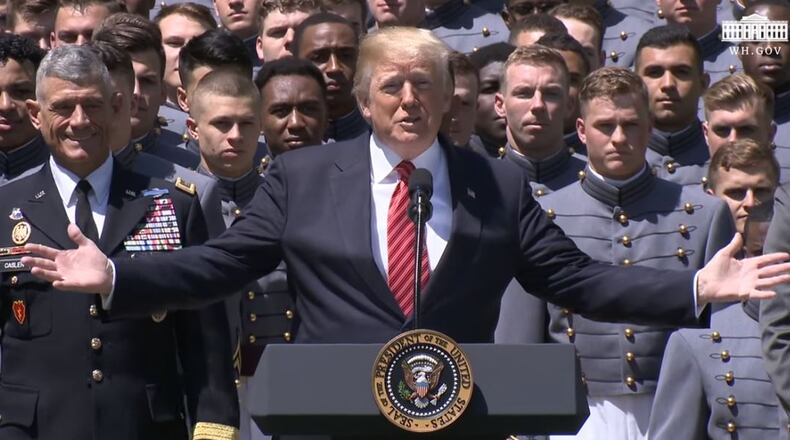"What are they afraid of?" Mr. Trump added. "At some point I will have no choice but to use the powers granted to the Presidency and get involved!" he tweeted.
It was the second time in less than a week that Mr. Trump had suggested a more active role in how the Russia probe was being conducted, and the activities of the Justice Department.
Last week during an interview on "Fox and Friends," Mr. Trump also complained about the investigation, and made clear he might do something about it.
“And our Justice Department – which I try and stay away from – but at some point, I won’t,” Mr. Trump said, making a statement which was interpreted by some as a threat to intervene in the case.
Today's tweet followed a pair of earlier social media blasts from the President, in which Mr. Trump again denied any wrongdoing over Russian interference in the 2016 elections.
"There was no Collusion (it is a Hoax) and there is no Obstruction of Justice," the President tweeted from the White House.
Mr. Trump then echoed the arguments of past Presidents who have found themselves under legal and ethical scrutiny, saying that press and public attention should be focused on the work of his administration and major issues, not the Russia investigation.
Mr. Trump's remarks came a day after his former attorney, John Dowd, confirmed to news organizations that Special Counsel Robert Mueller had brought up the possibility of forcing the President to testify before a grand jury about the investigation.
The talk of a possible subpoena came as the two sides were discussing an interview with the President on the many subjects involved in the Russia investigation - some of his supporters have argued against that, while Mr. Trump has given signals both for and against.
If a subpoena were to be issued, legal experts weren't sure that could ultimately be enforced.
"In fact, no sitting President has ever been forced to provide testimony as a target of a criminal investigation," wrote Harry Litman, a former U.S. Attorney and deputy assistant attorney general.
Some legal experts pointed to the Watergate case of United States v. Nixon, where the U.S. Supreme Court ordered the President to turn over the Watergate tapes from the Oval Office - but that was about evidence, not about actual testimony.
"The dispute between the Special Prosecutor and the President presents a justiciable controversy," Chief Justice Warren Burger wrote in a unanimous 8-0 decision.
During the Monica Lewinsky scandal, President Bill Clinton was served with a subpoena by Whitewater prosecutor Ken Starr, but ultimately appeared for testimony on a voluntary basis.
"I’d estimate the interview would take days to complete," said Clint Watts, a former FBI agent and counterterrorism expert.
"Dozens of questions would lead to dozens of follow ups," Watts said on Twitter.
Meanwhile, the gears of the Mueller investigation continued to grind - on Tuesday, a federal judge agreed to hold off on sentencing for former Trump National Security Adviser Michael Flynn, who .
Prosecutors have also delayed the next steps in sentencing for George Papadopoulos, a one-time foreign policy adviser to the Trump Campaign, who who also pleaded guilty to lying to investigators about his contacts with Russians.
A court hearing had originally been set for Papadopoulos on April 23; that was reset for May 23.
About the Author
